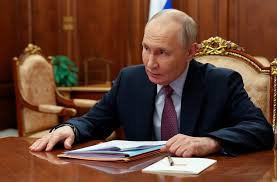
Putin Slams Financial ‘Neo-Colonialism’ Ahead of China Visit

 :
| Updated On: 30-Aug-2025 @ 12:04 pm
:
| Updated On: 30-Aug-2025 @ 12:04 pmSHARE
Russian President Vladimir Putin has sharply criticized Western sanctions and what he calls an “unfair” financial system that, in his view, discriminates against countries like Russia and destabilizes global economic order. His remarks come as Russia struggles with the economic fallout from trade restrictions and the mounting costs of the war in Ukraine, which have pushed its economy toward the brink of recession.
In an interview with China’s official Xinhua news agency, published on Saturday ahead of his visit to China, Putin denounced Western sanctions as a tool of “neo-colonialism.” He argued that finance is being weaponized to serve the interests of Western powers at the expense of the “Global Majority,” a term often used by Russia to describe non-Western nations. According to Putin, it is “essential to end the use of finance as an instrument of neo-colonialism,” since this undermines equitable growth and fair participation in the global economy.
Putin emphasized Russia’s alignment with China on the issue of global financial reform. He noted that both Moscow and Beijing support changes to the International Monetary Fund (IMF) and the World Bank to make them more inclusive and reflective of the real economic weight of member states. He called for the establishment of a new financial system based on “openness and true equity,” which would grant all nations equal and non-discriminatory access to financial tools and resources. In the interview, which was filled with praise for China, Putin expressed confidence that Russia and China would continue working together toward this goal and pledged joint efforts to secure prosperity for both nations.
Putin’s four-day visit to China, from Sunday to Wednesday, has been described by the Kremlin as “unprecedented.” His trip begins in the northern Chinese port city of Tianjin, where he will attend the two-day summit of the Shanghai Cooperation Organisation (SCO). The SCO, which was founded in 2001 by a coalition of Eurasian nations, has since expanded to 10 permanent members, including India and Iran. The organization focuses on regional security, economic cooperation, and counterbalancing Western influence.
Following the SCO summit, Putin will travel to Beijing to hold bilateral talks with Chinese President Xi Jinping. He will also attend a large military parade in the Chinese capital commemorating the end of World War II after Japan’s surrender. This event highlights the shared historical narratives of Russia and China, both of which emphasize their wartime sacrifices and their roles in defeating fascism.
The interview also underlined the growing economic dependence of Russia on China. After the West imposed sweeping sanctions on Moscow following its full-scale invasion of Ukraine in 2022, China emerged as Russia’s most important economic lifeline. Beijing began purchasing large volumes of Russian oil and gas, while also exporting goods ranging from automobiles to electronics to Russia. This trade relationship pushed bilateral trade to a record $245 billion in 2024, according to Putin. He stressed that nearly all transactions between the two countries are now settled in Russian roubles and Chinese yuan, reducing reliance on the US dollar.
Putin described Russia as one of China’s leading energy suppliers, particularly in oil and gas, and said both countries are working actively to reduce barriers to trade and deepen economic integration. He framed this partnership as a long-term strategic choice, not just a temporary response to Western sanctions.
Putin and Xi declared a “no-limits” strategic partnership in February 2022, just weeks before Russia launched its invasion of Ukraine. Since then, their relationship has only strengthened, with the two leaders meeting more than 40 times in the past decade. This enduring partnership is seen by both Moscow and Beijing as a counterweight to Western alliances such as NATO and the G7, and as a cornerstone for building what they describe as a more multipolar global order.
In summary, Putin’s interview and upcoming China visit underscore his twin priorities: resisting Western economic pressure and deepening ties with China. He frames the current Western-led financial system as discriminatory and outdated, while advocating for a new, more inclusive order led in part by Russia and China. At the same time, his visit highlights the deepening economic and strategic interdependence between Moscow and Beijing, particularly as Russia faces isolation from the West due to its ongoing war in Ukraine.